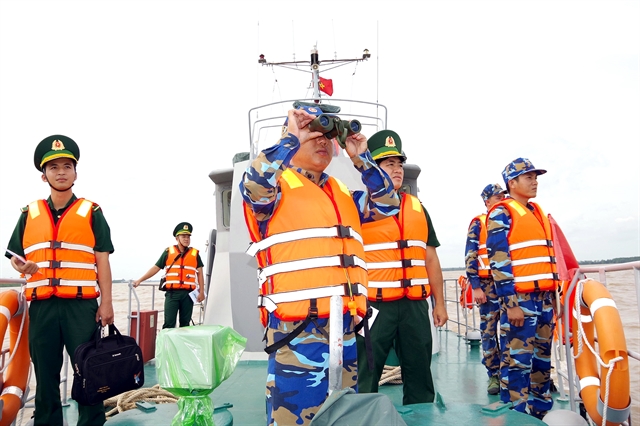 Society
Society

 |
| Border guard soldiers of the southern province of Sóc Trăng monitor offshore fishing vessels. VNA/VNS Photo Trung Hiếu |
In a recent interview with the Vietnam News Agency, Associate Professor Nguyễn Chu Hồi, deputy to the 15th National Assembly and Permanent Vice Chairman of Việt Nam Fishery Association talks about the progress and further solutions for Việt Nam to end illegal, unreported and undocumented fishing (IUU).
In the five years since the European Commission (EC)'s yellow-card warning against IUU in Việt Nam, what are the changes and progress that we have made?
Since the EC issued the warning for Việt Nam in 2017, the Government identified this as a critical issue and engaged the efforts of the whole political system (to tackle the issue). We have incorporated a list of 14 illegal commercial fishing activities in the amended Law on Fisheries in 2017.
The most notable change is improved awareness of both the authorities and fishermen with clear understanding of IUU. Despite being affected by the COVID-19 pandemic for two years, we have still been able to manage a stable production pace.
Việt Nam has also equipped fishermen with GPS devices and classified vessels to manage the fishing activities better.
Besides the progress, what are the things that we can improve?
Looking at the criteria set by EC, we can see that only four items are difficult for us to implement. The quantity doesn’t really matter but it is the criteria itself and whether we can overcome challenges to achieve our goals.
These (four) criteria are related to the nature of fishing sector in Việt Nam where fishing has been done on a small scale so it takes time to change. The list of 14 illegal commercial fishing activities stipulated in the Law on Fisheries in 2017 is just a way to identify illegal activities but not a solution. There is still a gap that needs to be bridged.
In addition, when fishermen no longer fish offshore or have IUU fishing activities, they would encounter many difficulties as places that are closer have no fish, and the prices of petroleum and oil have surged recently.
Therefore it is important that we have an inter-sectoral approach to resolve the issues related to IUU.
The State must have proper policies. In the fishing sector, there are three very important sub-sectors that need to be paid attention to: fishing economy, sea environment preservation and fishermen.
Some ASEAN countries including Thailand and the Philippines were in the past warned for IUU fishing but they addressed the problems quickly. What can Việt Nam learn from these experiences?
In these countries, the community and local authorities play a very important role. It means that the government and people act, benefit and manage together. Being warned about IUU, they adjusted their behaviours and enhance their capacity to address the problem.
I think the biggest lesson we can learn is that the fishing sector needs to have new, responsible management models that must be implemented as soon as possible.
What else can we do to develop a responsible and sustainable fishing sector?
I think the key solution is to preserve the resources and protect the sea environment. Efforts and progress made by fishermen will be all lost if the sea environment gets worse and is poisoned.
With regard to policy, it is imperative to have a resolution to address the problem using an inter-sectoral approach.
It is also important to continue to adjust the strategy of farming fish in the sea to reduce pressure on the fish catch as the fish capture is decreasing while the number of fishing vessels is still big.
We also have to think of supporting fishermen who quit illegal fishing, providing them resources to shift to another job.
With onshore fishing, we can think of developing entertainment activities in beautiful bays. Instead of having locals fishing for sale, they can offer services for tourists to fish as a tourism product.
When shifting from fish catch to fish farming, it is important to implement high-tech farming technique. Besides fishermen, fishery companies should also join as they have financial and technology resources. — VNS
Việt Nam works hard to prevent fishing vessels' infringement of foreign watersHÀ NỘI — The Ministry of Agriculture and Rural Development (MARD) will work with ministries, agencies and localities to strengthen patrols, inspections and control at sea to prevent vessels from infringing in foreign waters.The ministry will coordinate to improve the enforcement capacity of competent forces to fully implement international commitments and treaties related to fishing, especially the Agreement on Port State Measures, to combat illegal, unreported and unregulated (IUU) fishing in accordance with international practices, said Nguyễn Quang Hùng, deputy general director of the ministry’s Directorate of Fisheries (DoF).MARD will also increase investigations and assess resources to ensure sustainable output. It will effectively carry out projects on the exploitation and protection of aquatic resources, and the Fisheries Development Strategy approved by the Prime Minister to ensure the sustainable and responsible development of the fishing industry and the livelihoods of fishermen, he said.Earlier, at a reception for an European Commission (EC) delegation who came to Việt Nam to inspect the country's implementation of the EC recommendations, Deputy Prime Minister Lê Văn Thành said Việt Nam has been making all-out efforts to implement the EC recommendations on ending IUU fishing in the best possible manner toward a sustainable, responsible, and controlled fishing industry.He also reaffirmed Việt Nam’s strong commitment and concerted efforts by authorities, fishermen and businesses to prevent and eradicate IUU fishing.Hùng also informed that the EC delegation visited the central province of Khánh Hoà to inspect its efforts to tackle IUU fishing and held a working session with the DoF in late October.They focused on inspecting the management of fishing ships, traceability of aquatic products, law enforcement, and other related issues.The delegation is set to make their following field trip to Việt Nam in the next six months. — VNS